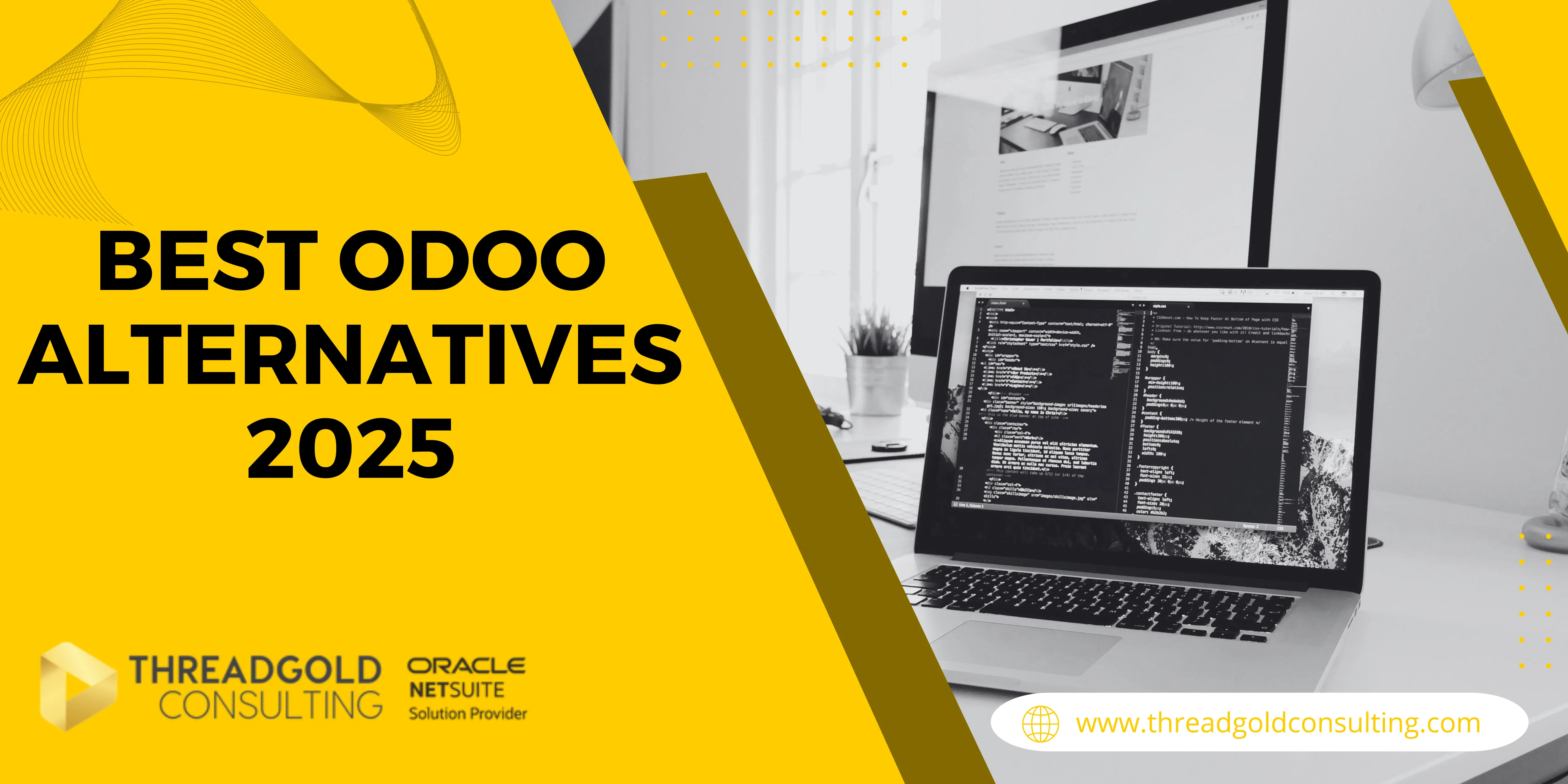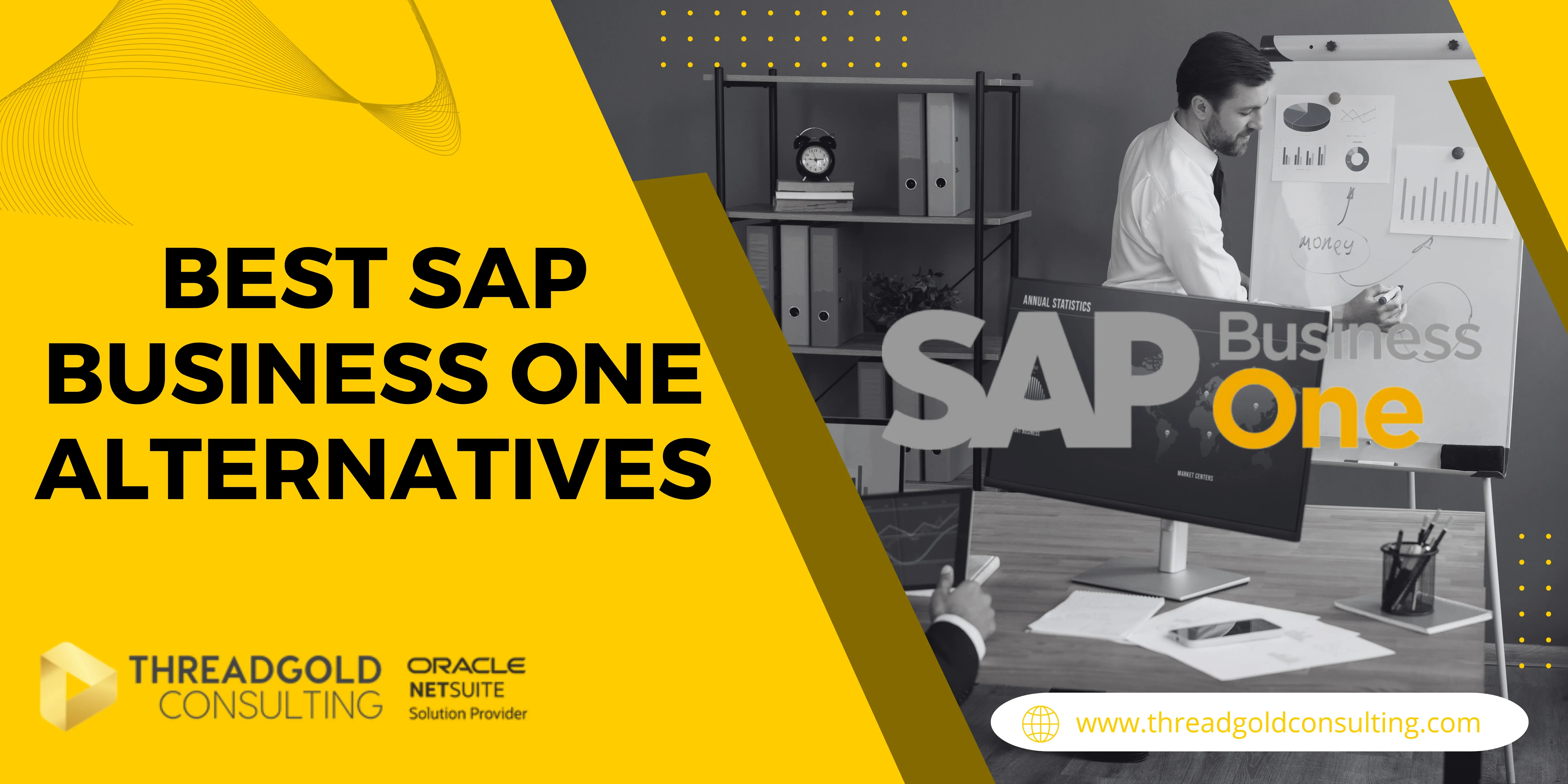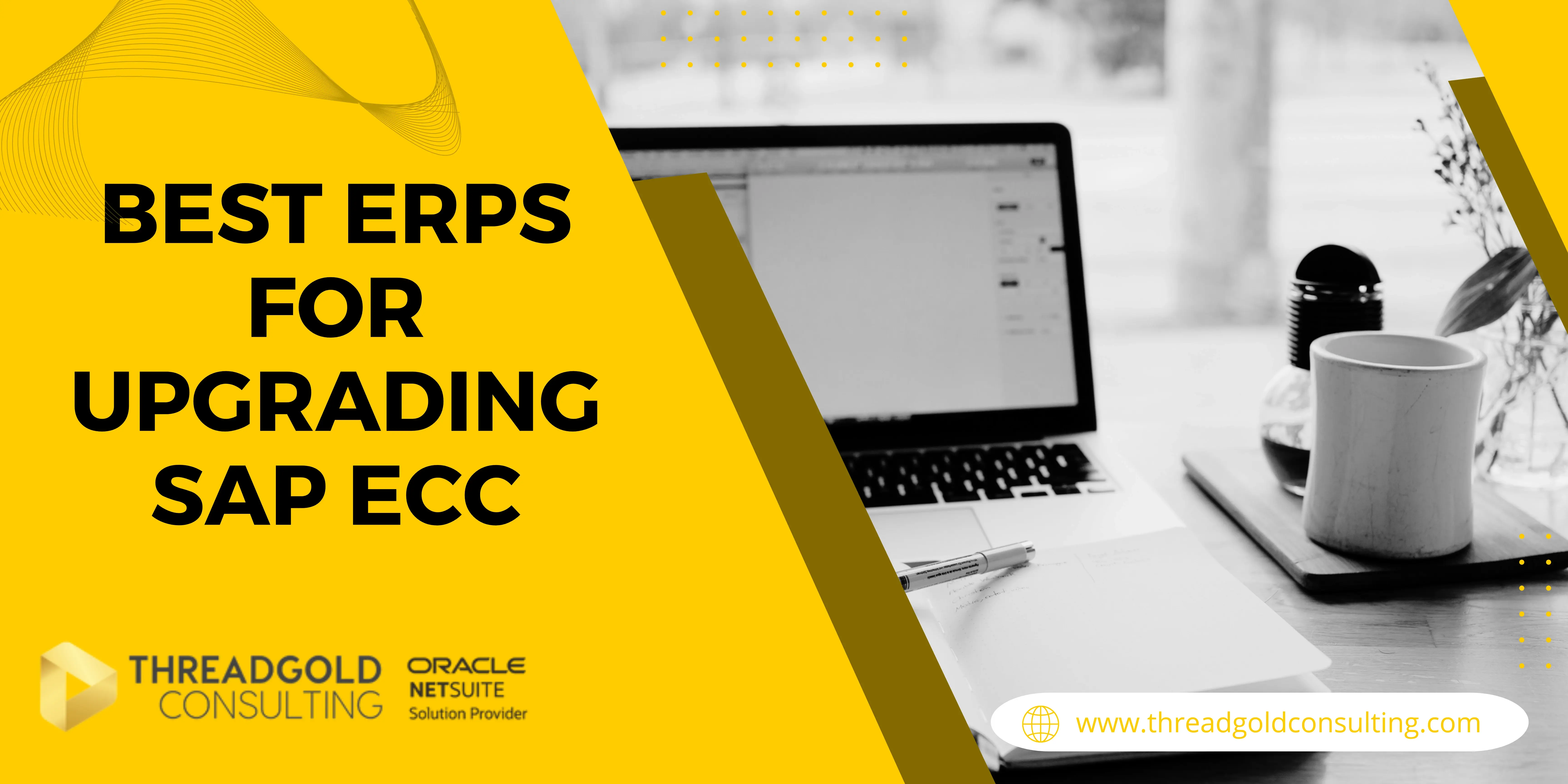Introduction to Odoo and Its Role in ERP
Enterprise Resource Planning (ERP) software are absolute key components in modern businesses. They enable them to streamline processes, enhance productivity, and integrate operations. Among the leading ERP platforms is Odoo. Odoo has become very popular to date, largely due to it's open-source flexibility, modular design, and affordability. With over 7 million users worldwide, Odoo has gained popularity among start-ups and small-to-medium-sized businesses.
Yet, Odoo isn’t the perfect fit for everyone. As businesses expand or face industry-specific demands, they often seek alternatives that better align with their requirements. Whether it’s due to pricing, scalability, or specialized features, the ERP market is full of sturdy options worth considering in 2025.
Why Businesses Look for Odoo Alternatives
As mentioned, despite its strengths, Odoo doesn't always meet every organization’s needs. Companies often search for alternatives because of several key factors mentioned below.
Cost and Budget Limitations
One of Odoo’s strongest selling points is its free community edition, which appeals to startups and smaller businesses. However, many quickly realize that the enterprise edition and essential add-ons can lead to unexpected expenses. Each additional module such as CRM, accounting, or manufacturing, comes with its own costs. When combined with things like hosting, implementation, and support services, the total can way exceed initial expectations.
Similarly, customization often requires the help of Odoo-certified partners or developers, which adds to the financial burden. For growing companies, this can mean spending thousands of dollars annually just to maintain a system that was initially thought to be affordable. This is why some businesses look toward open-source alternatives like ERPNext or lower-cost suites like Zoho One, which provide bundled features without hidden costs.
Scalability and Flexibility Issues
While Odoo is modular and flexible, it isn’t always the best choice for businesses that scale quickly. As organizations expand to multiple locations or international markets, they often need advanced multi-company, multi-currency, and compliance support that Odoo may struggle to provide out of the box. Solutions like NetSuite are ideal for companies looking for advanced financial consolidation.
Performance can also become an issue as transaction volumes grow. Companies with high-volume inventory or complex supply chains sometimes find Odoo’s architecture insufficient compared to enterprise-grade solutions like SAP Business One or Microsoft Dynamics 365, which are built to handle complex global operations.
In essence, Odoo works well for SMEs, but businesses preparing for rapid scaling or global expansion may hit limitations that make migration to another ERP inevitable.
Industry-Specific Needs
Odoo offers a wide range of general-purpose business modules, but it doesn’t always provide deep industry-specific functionality. For instance, manufacturers may require advanced production scheduling, shop floor control, and real-time IoT integration, which are better handled by solutions like NetSuite or SAP Business One.
Similarly, service-based companies in industries such as healthcare, education, or professional services often need features like regulatory compliance, specialized billing models, or case management, areas where Odoo’s generic tools may fall short.
Businesses in accounting-heavy industries may also prefer tools like TallyPrime, which are designed around financial management rather than general ERP. In other words, while Odoo provides breadth, it sometimes lacks the depth and specialisation that businesses in certain industries require.
Key Features to Look for in an Odoo Alternative
Before exploring the best Odoo alternatives, it’s crucial to identify what features matter most so you can make an informed decision.
- User-Friendliness: An ERP should have an intuitive interface, minimizing the learning curve for employees.
- Integration Capabilities: Seamless integration with existing tools like CRMs, HR systems, or e-commerce platforms ensures smooth workflows.
- Customization Options: The ability to tweak the software to match business processes is vital for long-term adoption.
- Pricing Models: Transparent, scalable pricing ensures businesses can forecast costs accurately without unexpected fees.
It's also important to highlight the features specific to your business that you will require, and the best way to do this is by carrying out a business process review. This entails looking at your entire business, understanding the processes you run and mapping the features required that will enable these processes to run efficiently.
Best Odoo Alternatives in 2025
So without further ado, here are the top ERP solutions to consider if Odoo doesn’t fully meet your business needs.
1. ERPNext – Open-Source & Flexible
ERPNext is one of the most popular open-source ERP solutions available today. It’s known for its flexibility, cost-effectiveness, and wide array of built-in business applications. Unlike Odoo, ERPNext provides a simpler and more intuitive interface, making it accessible even for non-technical users. Its community-driven development ensures continuous innovation and transparency.
Modules & Features:
- Accounting & Finance: Invoicing, expense tracking, and tax compliance.
- Inventory Management: Stock control, warehouse tracking, and multi-location support.
- Human Resources: Payroll, attendance, and employee performance.
- Manufacturing: Production planning, bill of materials, and work orders.
- CRM: Customer database, lead management, and sales tracking.
- Project Management: Task scheduling and project timelines.
Pricing:
- Open-source version: Free
- Cloud hosting: Starts at $10–$25/user/month depending on hosting provider.
Best Suited For:
Small-to-medium businesses that want a budget-friendly, customizable ERP. It’s especially useful for companies with strong in-house IT teams.
2. SAP Business One – For Growing Enterprises
SAP Business One is a powerful ERP tailored for small and medium-sized enterprises (SMEs). It’s part of SAP’s extensive ERP ecosystem, known for reliability, scalability, and global support. Unlike Odoo, SAP Business One provides stronger analytics, reporting, and compliance features. It’s particularly favored by businesses aiming for international expansion.
Modules & Features:
- Financial Management: Real-time accounting, cash flow, and compliance tools.
- Sales & Customer Management: CRM, pipeline tracking, and after-sales support.
- Purchasing & Inventory: Procurement automation, stock tracking, and vendor management.
- Production & MRP: Manufacturing resource planning and production scheduling.
- Analytics & Reporting: Dashboards, KPIs, and customizable reports.
Pricing:
- One-time license fee: Around $3,000–$3,500 per user
- Cloud subscription: Starts from $94 per user/month
Best Suited For:
SMEs looking to scale into larger enterprises with substantial global operations. It’s best for companies needing strong compliance, reporting, and manufacturing tools.
3. Oracle NetSuite – Cloud-Based ERP Leader
NetSuite is one of the world’s leading cloud-based ERP platforms, owned by Oracle. It’s widely used by mid-to-large enterprises across industries for its flexibility and enterprise-grade features. NetSuite stands out for its scalability, real-time financial insights, and strong cloud infrastructure. Unlike Odoo, it provides out-of-the-box solutions for multinational corporations.
Modules & Features:
- Financial Management: Advanced accounting, budgeting, and forecasting.
- Order & Inventory Management: Multi-location warehouses, demand planning.
- CRM: Sales automation, marketing campaigns, and customer portals.
- E-commerce: Integrated online store with ERP backend.
- Human Resources: Workforce management, payroll, and talent acquisition.
- Business Intelligence: Real-time dashboards and KPI tracking.
Pricing:
- Starts at around $120 per user/month, plus a base license fee (~$999/month).
- Check our our NetSuite pricing guide for a further deep dive into the costs of licensing and implementing NetSuite
Best Suited For:
Can be suited for small companies requiring limited functionality, but mostly appropriate for mid-to-large enterprises seeking a fully cloud-based ERP with international scalability. It’s ideal for fast-growing companies managing complex supply chains.
4. Zoho One – Affordable Business Suite
Zoho One is an all-in-one cloud suite with more than 45 integrated business applications. It’s highly affordable, making it one of the best choices for startups and SMEs. Unlike Odoo, which requires paid modules for key functions, Zoho One provides a unified subscription covering CRM, HR, finance, and operations. Its user-friendly design makes it accessible even to non-technical teams.
Modules & Features:
- CRM: Sales automation, lead scoring, and pipeline tracking.
- Finance: Invoicing, expense management, and bookkeeping.
- HR & Payroll: Attendance, onboarding, and employee records.
- Marketing: Email campaigns, analytics, and social media integration.
- Collaboration: Chat, document sharing, and project management.
Pricing:
- $37 per user/month (all employees plan)
- $90 per user/month (flexible user plan)
Best Suited For:
Small businesses and startups wanting an affordable, all-in-one business suite. It’s perfect for teams that need collaboration tools alongside ERP functions.
5. Microsoft Dynamics 365 Business Central – SMB ERP Powerhouse
Microsoft Dynamics 365 Business Central is a modern, cloud-based ERP designed specifically for small and medium-sized businesses. Unlike Odoo, which can become costly with multiple add-ons, Business Central offers two clear subscription tiers, Essentials and Premium, that bundle core modules for finance, sales, purchasing, and supply chain. Its tight integration with Microsoft tools like Office 365, Teams, and Power BI ensures a seamless user experience across business functions.
Modules & Features:
- Finance & Operations: Comprehensive accounting, compliance, and financial reporting tools
- Sales & Customer Management: CRM features for quotes, orders, and customer relationships
- Supply Chain & Inventory: Real-time tracking, warehouse management, and demand forecasting
- Project Management: Tools for resource planning, budgets, and job costing
- Advanced Options (Premium plan): Service order management and full manufacturing modules
- AI & Analytics: Embedded Power BI dashboards and AI-driven suggestions for productivity
Pricing:
- Essentials licence: $70 per user/month
- Premium licence (includes manufacturing): £$100 per user/month
Best Suited For:
Microsoft Dynamics 365 Business Central is best suited for small to mid-sized companies that want a reliable, scalable ERP within the Microsoft ecosystem. Businesses already using Outlook, Excel, or Azure will find its integrations especially valuable.
6. Dolibarr – Open-Source ERP/CRM
Dolibarr is a lightweight, open-source ERP and CRM solution. It’s simple to install, easy to use, and supported by an active global community. Unlike Odoo, Dolibarr emphasizes simplicity and is less resource-intensive, making it suitable for small teams. Its modular design allows businesses to activate only the features they need.
Modules & Features:
- CRM: Contacts, leads, and proposals.
- ERP: Invoicing, contracts, and project management.
- Inventory Management: Stock control and supplier tracking.
- HR: Employee records, leave management.
- Website Builder: Basic CMS integration.
Pricing:
- Free (open-source version)
- Paid hosting starts at around $12–30/month
Best Suited For:
Freelancers, startups, and small businesses that need a free, lightweight ERP. Great for teams with limited IT resources.
7. TallyPrime – Accounting-Focused ERP
TallyPrime is a well-known ERP solution primarily focused on accounting and finance. It has a strong presence in India and other global markets, especially among SMEs. Unlike Odoo, it focuses on robust financial management with GST compliance and simple usability. Its intuitive design makes it a favorite among accountants and small business owners.
Modules & Features:
- Accounting & Taxation: GST, VAT, and compliance reporting.
- Payroll Management: Salary processing and compliance deductions.
- Inventory Management: Stock categorization and batch-wise tracking.
- Banking: Bank reconciliation and digital payments integration.
Pricing:
- Silver edition (single user): $250–$300 one-time license
- Gold edition (multi-user): $800–900 one-time license
Best Suited For:
Accounting-focused SMEs that want a straightforward ERP for financial compliance. Especially popular among Indian businesses.
| ERP Solution | Best For | Deployment | Pricing Model |
|---|---|---|---|
| ERPNext | SMEs & startups | Cloud & On-premise | Open-source / Free |
| SAP Business One | Growing enterprises | On-premise & Cloud | License + Subscription |
| NetSuite | Mid-to-large companies | Cloud | Subscription + base fee |
| Zoho One | Small businesses | Cloud | $37–$90/user/month |
| Microsoft Dynamics 365 | Large enterprises | Cloud & Hybrid | $50–$180/user/month |
| Dolibarr | Freelancers & SMEs | On-premise & Cloud | Free / $12–30/month |
| TallyPrime | Accounting-focused SMEs | On-premise | $250–900 one-time |
How to Choose the Right ERP for Your Business
Selecting the right ERP system goes beyond comparing feature lists—it’s about finding a solution that aligns with your current operations, growth trajectory, and industry-specific requirements. By carefully evaluating your needs, you can avoid costly mistakes and ensure your ERP investment drives long-term success.
Identifying Business Needs
The first step in choosing an Odoo alternative is to clearly define your company’s challenges and objectives. Many businesses rush into ERP adoption without mapping out what processes actually need improvement, which leads to overspending on unnecessary features.
Ask yourself:
- Do we primarily need stronger accounting and financial management tools?
- Are CRM and customer engagement features more important for driving revenue?
- Do we need manufacturing, supply chain, or inventory automation?
- How important is regulatory compliance in our industry?
By outlining your top priorities, you can filter out ERP solutions that don’t align with your requirements, saving time and ensuring you only pay for what you truly need.
Considering Future Growth
ERP systems are long-term investments, often used for 5–10 years or more. Choosing software that meets your needs today but fails to scale with your business can lead to costly migrations later.
For example, a small e-commerce store might start with a basic ERP, but as it expands into international markets, it may require multi-currency support, global compliance features, and advanced reporting tools. Some ERPs—like NetSuite or Microsoft Dynamics 365 Business Central—are built to handle this level of scalability, while others may require complex workarounds or additional modules.
When evaluating an ERP, consider:
- How many users you’ll need now vs. in 3–5 years
- Whether the system can handle multi-entity or multi-currency operations
- The availability of advanced modules (e.g., manufacturing, advanced analytics)
- Cloud vs. on-premise deployment flexibility
Evaluating Support & Community
Even the best ERP systems come with a learning curve, which makes support and community resources invaluable. A strong support system ensures that issues are resolved quickly, minimizing downtime and frustration.
When researching ERP alternatives, pay attention to:
- Customer support options: Is 24/7 support available? Are there local partners or consultants?
- Community size and activity: Open-source ERPs like ERPNext and Dolibarr benefit from large, active user communities that provide free plugins, documentation, and troubleshooting tips.
- Training and onboarding resources: Look for official academies, webinars, and certifications that can help your team adopt the system faster.
- Update frequency: Regular updates show that the platform is actively maintained and evolving with new technology.
Investing in a solution with strong support and a knowledgeable community ensures your ERP system remains reliable, secure, and aligned with business needs.
FAQs About Odoo Alternatives
Q1. Is Odoo the best ERP for small businesses?
Odoo is excellent for small businesses, but ERPNext and Zoho One are often better suited for tighter budgets.
Q2. Which Odoo alternative is free?
ERPNext and Dolibarr are free, open-source options with active community support.
Q3. Which ERP is best for accounting-heavy businesses?
TallyPrime and NetSuite are great for finance-focused businesses.
Q4. Can I migrate data easily from Odoo to another ERP?
Yes, most ERPs offer migration tools, though professional help may be needed for complex setups.
Q5. Which ERP is best for enterprises?
Microsoft Dynamics 365 and NetSuite are powerful choices for large enterprises.
Q6. What’s the most affordable Odoo alternative?
Zoho One is the most affordable all-in-one alternative, ideal for small businesses.
Finding the Right ERP Beyond Odoo
While Odoo remains a strong ERP solution, it’s not the only option in the market. Businesses have plenty of Odoo alternatives like ERPNext, SAP Business One, NetSuite, Zoho, and Microsoft Dynamics 365 that offer unique advantages. The best choice depends on your company size, industry, and future growth plans.
For startups, ERPNext and Zoho One provide cost-effective solutions. For larger enterprises, NetSuite and Microsoft Dynamics 365 deliver enterprise-grade capabilities. Ultimately, the right ERP system will be one that aligns with your business strategy, budget, and long-term vision.




.png)

